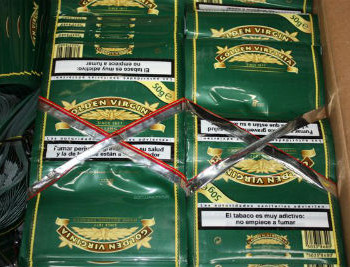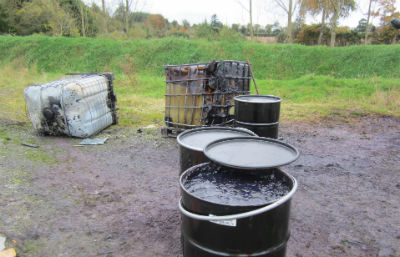The cost of illicit trade on society

Illicit trade is a burden to society. The public may still view it as a problem for businesses or corporations that are worried about losing out on profits. However every member of society is actually affected by the shadow economy
5 December 2013
The additional burden on taxpayers due to the criminal actions of a few is a topic not discussed enough. Tax lost to the Irish exchequer as a result of illicit tobacco alone is estimated by revenue at €250 million and by the tobacco industry at more than double that. That money would go far in the Department of Health, which has attempted to cut €666 million from the health budget this year. Similarly, laundered fuel has cost the exchequer nearly €200 million. This is money going straight into the hands of criminals. If one adds up the illicit trade in all sectors; alcohol, tobacco, fuel, medical and so on the cost to the exchequer and society reaches €1 billion.
Reporting illicit trade
Revenue operates a smuggling hotline for the purpose of reporting illicit crime. Members of the public are encouraged to report any suspicious activity to this hotline. According to the figures, either the public are not aware of the service or are unwilling to use it. Statistics from Revenue are low on the usage of the hotline with the number of calls received through in 2010, 2011 and 2012, being 197, 97 and 137, respectively. These numbers do not correspond with the increasing levels of black market trade across the country. In 2012, Ireland experienced a growth in the percentage of non Irish duty paid products with empty tobacco pack survey figures from MS Intelligence showing a growth of 26.9% in 2011 to 28.2% in 2012. Yet only 18 calls out of the 431 made to the freefone line during these three years directly resulted in seizures.
Less tolerance for tax evasion
Poor information has been cited as one reason and perhaps it is necessary to raise awareness about what is required to ensure these criminals are caught. However, Philip Cox from the Department of Social Protection reports he has seen an increase in recent years in the number of good citizen reports. "People in Irish society these days have less tolerance for tax and non-compliance and less tolerance for social welfare abuse."

Toxic waste found in Louth
Environmental impact
This signals a good change in attitude. If the damage to society caused by buying illicit tobacco or laundered fuel becomes more apparent, there may be an increase in co-operation among the general public. Louth has been a hot spot for fuel laundering over the last number of years with 10 laundering sites uncovered since 2009. As a result of these laundries, there have been considerable problems with waste by-product left behind after the laundering process. A Louth County Council spokesman recently reported that 68 incidents of illegal dumping of toxic sludge had already been recorded this year (up to September). The largest amount of waste found was 500 tonnes and there were serious concerns about its proximity to the Cavanhill water treatment plant that serves Dundalk town. Fortunately, it was later confirmed that no contamination of the water supply had occurred. On another occasion, two 1,000 litre containers of toxic sludge were found abandoned in South Armagh. Some of the contents had entered a nearby road gully and a minor volume of liquid waste had reached the river. Steps were quickly put into place by the Northern Ireland Environment Agency to stop any further leakage.
Health Risks
Illicitly traded tobacco and alcohol products are equally damaging to society in a number of ways. Occurring outside of the regulatory framework, these products do not follow strict health warnings or maximum tar and nicotine levels. It has been reported that counterfeit tobacco has been found to contain arsenic, rat droppings and far more tar and carbon monoxide than legal products. A report from 2009 by the World Customs Organisation*** reported a finding of counterfeit cigarettes containing mites. This container had also been hidden using aberrant methods that posed serious health risks for law enforcement officers. One example given was a barrel of titanium sponge containing toxic chlorine gas.
Increase in counterfeit alcohol
Counterfeit alcohol is considerably more dangerous, with no indication what may have been used in its production. Revenue seized nearly four times more counterfeit alcohol in 2013 than in 2012, up to 840 litres so far this year. In August, Michael McGill from Revenue’s Central Investigation Branch said: "If there’s a high concentration of methanol, that can lead to blindness and even death if you drink enough of it. The problem is that there isn’t any regulation of it and the people making it don’t know what strength it is, they do not have a scientific way of doing things. If we look at Poland two years ago, 20 people died there from drinking illicit alcohol". Counterfeit alcohol with critical levels of methanol was seized in July this year after it was advertised on Facebook. Sales are focused on minors who cannot buy products legally and on those with low incomes.
Raise awareness
There is a demand for illicit products. Unfortunately, where there is a good distribution chain and a ready market, the rule of law is undermined and the unscrupulous thrive. Consumers look for a bargain but perhaps unwittingly pay a higher price in the long term. A campaign is required to raise awareness of the impact this is having on society but also to encourage and motivate action that will help in the prosecution of these criminals.



 Print
Print






Fans 0
Followers